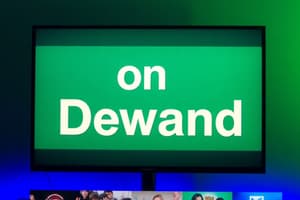Podcast
Questions and Answers
What is a potential reason traditional TV and platforms like YouTube do not compete directly?
What is a potential reason traditional TV and platforms like YouTube do not compete directly?
- YouTube focuses on user-generated content which is mostly non-commercial. (correct)
- YouTube only features documentaries and educational programs.
- Traditional TV only offers live broadcasts and no recorded content.
- YouTube's content is primarily professional and commercial.
What is a notable trend observed regarding content providers on YouTube?
What is a notable trend observed regarding content providers on YouTube?
- They are mostly traditional TV networks transitioning to online formats.
- They are primarily amateur users with no commercial interests.
- They exclusively focus on informal social interactions.
- They have begun to earn significant revenues through advertising. (correct)
Which content consumption purpose is YouTube primarily associated with?
Which content consumption purpose is YouTube primarily associated with?
- Binge-watching series
- Watching full-length movies
- Quick information access and entertainment during breaks (correct)
- Participating in live audience engagement
What distinguishes on-demand video services (VoD) from traditional television?
What distinguishes on-demand video services (VoD) from traditional television?
Why are quality television shows typically defined as having a 'higher style'?
Why are quality television shows typically defined as having a 'higher style'?
What audience type is often associated with quality television?
What audience type is often associated with quality television?
Which network is credited with popularizing the concept of quality television in the 1990s?
Which network is credited with popularizing the concept of quality television in the 1990s?
What primarily set HBO apart in the television industry?
What primarily set HBO apart in the television industry?
Which aspect of 'Game of Thrones' was NOT a primary reason for its Emmy Award wins?
Which aspect of 'Game of Thrones' was NOT a primary reason for its Emmy Award wins?
What is one characteristic that defines quality television?
What is one characteristic that defines quality television?
What kind of themes do quality television shows often explore?
What kind of themes do quality television shows often explore?
Flashcards are hidden until you start studying
Study Notes
Content Differences
- Traditional TV and Video-on-Demand (VoD) services face competition, with different types of VoD services including AVoD (advertising-based video on demand), PVoD (pay-per-view video on demand) and SVOD (subscription video on demand).
- YouTube, being an AVoD platform, is often argued to not compete with traditional TV and PVoDs like Netflix due to its predominantly user-generated content.
- However, YouTube has experienced a shift towards professionalized content, with creators generating significant revenue through advertisements and product placements. Commercial content on YouTube now makes up a significant portion of views.
- Traditional televison, PVoDs like Netflix and new players like Disney+ and Apple TV+ compete for audiences through exclusive and original content.
Purpose-Specific Content and Consumption Patterns
- Content differences between platforms can be linked to different purposes of usage, with YouTube specializing in shorter videos for quick information or social engagement.
- Netflix and traditional TV focus on longer video content like movies and shows, targeted towards filling longer periods of entertainment.
- Though YouTube is often used for shorter breaks and in-between moments, the professionalization of AVoD content is leading to longer average video lengths, blurring the lines between platforms.
- The rise of "binge watching" allows for hours of continuous video consumption regardless of individual video length, further highlighting the converging trends in content consumption.
Linearity, Devices and Social Network Elements
- VoD differs from traditional TV due to its non-linear nature, allowing consumers to access content at any time without a fixed schedule.
- TV and PVoDs like Netflix are often consumed on larger screens, while AVoD services like YouTube are primarily accessed through mobile devices.
- While mobile content download allows for consumption on the go, the distinctions between platforms are blurring due to consumer preference for specific shows across platforms.
- Social networking elements like commenting, sharing and liking are prominent features for AVoD and PVoD services, while linear TV recently incorporated audience engagement features like live show interactions.
Economics of Attention
- Content providers compete for consumer attention, which is a scarce resource in the age of information overload.
- The economics of attention implies that users cannot allocate their limited attention to multiple services simultaneously, illustrating the competitive nature of the market.
- Though there are differences in details, a significant portion of content across all platforms caters to entertainment, creating a direct competition for consumer time.
- Netflix, for instance, is seen as a potential replacement for TV, offering similar content but enabling non-linear access and user customized content selection.
- While individualized choice is beneficial, in situations like relaxing entertainment at the end of a day or passive consumption, traditional TV might be preferred due to its low cognitive demand.
- TV viewers might also find value in shared social experiences and cultural inclusivity, provided by watching popular programs together.
- Bundling of information and entertainment, such as news and prime-time movies, may be considered valuable by consumers and difficult to recreate through PVoD and AVoD.
- However, newer services offer algorithmic recommendation systems that can act as a substitute for linear program schedules, suggesting content based on individual data.
- This aims to simplify the consumption process and lower the cognitive cost of choosing content, with features like autoplay modes, content suggestions, and trailers.
Television Viewing Habits & Trends
- TV drama viewing is evolving: While traditional TV drama viewing still occurs, it's influenced by non-linear television, leading to a more social experience.
- Streaming services are gaining popularity: Netflix is a preferred platform for TV content in the United States, signifying a shift in viewing habits.
- Average daily TV viewing in Germany: In 2018 and 2019, average daily television viewing time varied depending on age group indicating generational differences in media consumption.
- TwitchTV challenges traditional TV viewing norms: Its interactive nature fosters a new form of participation and audience engagement, impacting the way television is consumed.
- YouTube is a hub for diverse content: Its content includes videos ranging from entertainment to educational, highlighting its broad appeal.
- YouTube Premium offers additional features: It provides an ad-free experience, access to exclusive content, and offline viewing, indicating a shift towards premium services within the platform.
Media Industry Mergers & Transformations
- Media mergers are becoming more common: The US media industry is seeing both vertical and horizontal mergers, leading to potential changes in the landscape.
- Cord-cutting is on the rise: Consumers are choosing web-streaming television over traditional cable TV, reflecting a shift in media consumption.
- International distribution of television content is changing: Organizations are adapting their strategies to address transformations in the global marketplace.
Research & Methods
- Simons (2015) investigated social aspects of TV drama viewing in the non-linear television era.
- Spilker et al. (2020) explored the impact of TwitchTV on traditional television habits.
- Statist (2018) analyzed Netflix's popularity in the US.
- Statist (2020) provided data on average daily TV viewing time in Germany.
- Steemers (2014) examined the changing landscape of international television content distribution.
- Stöhr, Noskova, Kunz-Kaltenhäuser, Gaenssle, and Budzinski (2020) investigated the effects of mergers in the US media industry.
- Tefertiller (2018) focused on media substitution related to cable cord-cutting.
- Turek (2019) analyzed the types of content prevalent on YouTube.
- Van den Bulck and Enli (2014) explored how media convergence affects television scheduling techniques.
- Vanberg (2002) compared rational choice and program-based behavior theories.
- WV (2019) examined RTL Group's shift towards streaming.
- YouTube Official Blog (2018) announced the launch of YouTube Premium.
- Zellner (1962) proposed an efficient method for estimating seemingly unrelated regressions.
- Zellner (1963) provided findings on estimators for seemingly unrelated regression equations.
- Zellner and Huang (1962) further explored the characteristics of efficient estimators.
Quality Television
- Quality television has evolved since the 1990s with shows featuring complex narratives, larger budgets, and well-known actors
- HBO pioneered the concept with premium subscription services, offering creative freedom and attracting a higher-income audience.
- Streaming services have contributed to the expansion of quality television, offering original productions and bypassing traditional advertising models
Acting in Quality Television
- High-quality acting performances are crucial for the success of any quality television show.
- The success of shows like The Americans, with its complex character development, demonstrates the impact of well-chosen actors
Game of Thrones as Quality Television
- Game of Thrones, a fantasy series, has achieved enormous success as a quality television show.
- Its special effects, locations, cinematography, and captivating battle sequences contribute to its high production value.
- The show's ensemble cast, including British actors, has garnered significant recognition for their performances.
Quality Television Performance = Success
- The acting performances, writing, and production value of quality television, create audiences who return for every episode.
- Quality television shows are the most successful because they are captivating and compelling for viewers.
Quality Television
- Quality television is characterized by complex narratives, elaborate production design, bigger budgets, and well-known actors.
- It often features realistic themes and darker topics, such as sex, money, and violence.
- Quality television is often associated with a "highbrow" audience, particularly affluent, white, and straight males.
- These shows receive more recognition and awards nominations due to larger audiences and greater production budgets.
HBO and the Rise of Quality Television
- HBO played a pivotal role in establishing the market for quality television in the 1990s.
- HBO focused on high-quality programming with creative freedom and a premium subscription model, not beholden to advertisers.
- HBO’s success inspired other channels and networks to create their own quality television shows.
- The emergence of streaming services further expanded the reach of quality television beyond cable.
- Streaming services provide greater budgets and creative freedom, allowing for less reliance on advertisers and commercial interruptions.
Acting Performances and Quality Television
- Excellent acting performances are crucial to the success of quality television, frequently contributing to a show's recognition and success.
- The Americans, a show that excelled in acting performances, received numerous Emmy nominations and awards. The show's success was attributed to compelling writing and casting talented actors.
- The popularity of quality television shows is boosted by memorable performances by famous actors, often contributing to the overall conversation surrounding the show.
- High-quality performances are the most important component of successful quality television shows.
Game of Thrones: A Case Study
- Game of Thrones, despite its fantasy setting, is widely considered quality television due to its acting performances, special effects, and production value.
- The show won a record-breaking 59 Primetime Emmy Awards, recognizing its excellence in acting, writing, and production design.
- While the show garnered numerous acting nominations, its success was also attributed to its complex writing and elaborate visuals. Game of Thrones' success boosted the careers of many actors in the show.
- British actors have played a significant role in the success of American quality television shows demonstrating talent and prestige.
The Significance of Performance
- Quality television shows are distinguished by exceptional performances that contribute to their popularity and success.
- The captivating and engaging performances, along with high production value, make quality television a powerful medium that keeps audiences engaged.
Studying That Suits You
Use AI to generate personalized quizzes and flashcards to suit your learning preferences.




